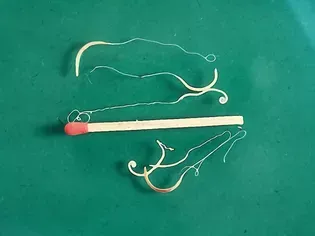Whipworms in Dogs
Updated on 05/27/24

Unveiling the Hidden Threat: Whipworms in Dogs
Whipworms, insidious parasites, can wreak havoc on the health of our beloved canine companions. As responsible dog owners, it's crucial to arm ourselves with knowledge about this prevalent threat and take proactive measures to safeguard our pets' well-being. This comprehensive guide will shed light on whipworms, their cunning tactics, and the essential steps to combat their invasion.
What are Whipworms?
Whipworms (Trichuris vulpis) are parasitic nematodes that reside in the large intestine of dogs. These slender, whip-like worms measure approximately 3-5 cm in length and are characterized by a distinctive thickened anterior end. Adult whipworms firmly attach themselves to the intestinal lining, where they feed on the host's blood and tissue.
How Do Dogs Get Whipworms?
Dogs typically acquire whipworms by ingesting microscopic whipworm eggs present in soil or feces from infected animals. Once ingested, the eggs hatch into larvae within the dog's digestive tract. These larvae then migrate through the intestinal wall and develop into adult worms in the large intestine.
Symptoms of Whipworm Infection
Whipworm infections can present with a range of symptoms, depending on the severity of the infestation. In some cases, dogs may remain asymptomatic, while in others, they may exhibit signs such as:
* Chronic diarrhea, often containing blood or mucus
* Weight loss
* Reduced appetite
* Anemia
* Abdominal pain
* Tenesmus (straining to defecate)
* Rectal prolapse in severe cases
Diagnosis and Treatment
Diagnosing whipworms involves microscopic examination of a dog's stool sample to detect whipworm eggs. Once confirmed, treatment typically involves the administration of antiparasitic medication, such as fenbendazole or milbemycin oxime. It's crucial to adhere to the prescribed treatment regimen to ensure effective elimination of the parasites.
Preventing Whipworm Infections
Prevention is always better than cure. Here are some proactive measures to minimize the risk of whipworm infection in dogs:
* Regular deworming: Consult with your veterinarian to establish an appropriate deworming schedule for your pet.
* Sanitation: Clean up dog feces immediately and dispose of them properly. Avoid areas where dogs are not permitted to defecate.
* Keep dogs away from contaminated soil: Prevent dogs from eating soil or licking the ground in areas where whipworm eggs may be present.
* Use preventative medications: Some veterinary products combine dewormers with heartworm preventatives, offering comprehensive protection against parasites.
Example Cases
To illustrate the consequences of whipworm infection, consider the following cases:
Case 1: Bella, a 2-year-old Golden Retriever, presented with persistent diarrhea and weight loss. Stool analysis revealed a heavy whipworm infestation. After treatment with fenbendazole, Bella's symptoms gradually resolved, and she regained her health and vitality.
Case 2: Max, a 5-year-old Labrador Retriever, showed no clinical signs but was found to have whipworm eggs in his stool during a routine veterinary checkup. Immediate deworming prevented the development of more severe symptoms and ensured Max's continued well-being.
Conclusion
Whipworms pose a significant threat to dogs' health. By understanding their biology, transmission methods, and symptoms, we can effectively combat this parasitic menace. Regular deworming, meticulous sanitation, and preventive measures are essential to protect our canine companions from the detrimental consequences of whipworm infection. Remember, a healthy dog is a happy dog, so let's prioritize their well-being by staying vigilant against this hidden threat.
Explore More Pets

Basic Training
Puppy and Baby Introductions

Working Dog Breeds
All About Search and Rescue Dogs

Dog Treatments
Puppy Vaginitis: Signs, Causes and Treatment

Dog Adoption
After More Than 1,200 Days in the Shelter, Coco Goes Home

Basic Training
How to Train Your Puppy to Go on Potty Pads

Hybrid Dog Breeds
The Difference Between a Mutt, Mixed Breed, or Designer Dog?

Dog Treatments
Nail Problems in Dogs

Puppies
7 Reasons Why Two Dogs Are Better Than One
